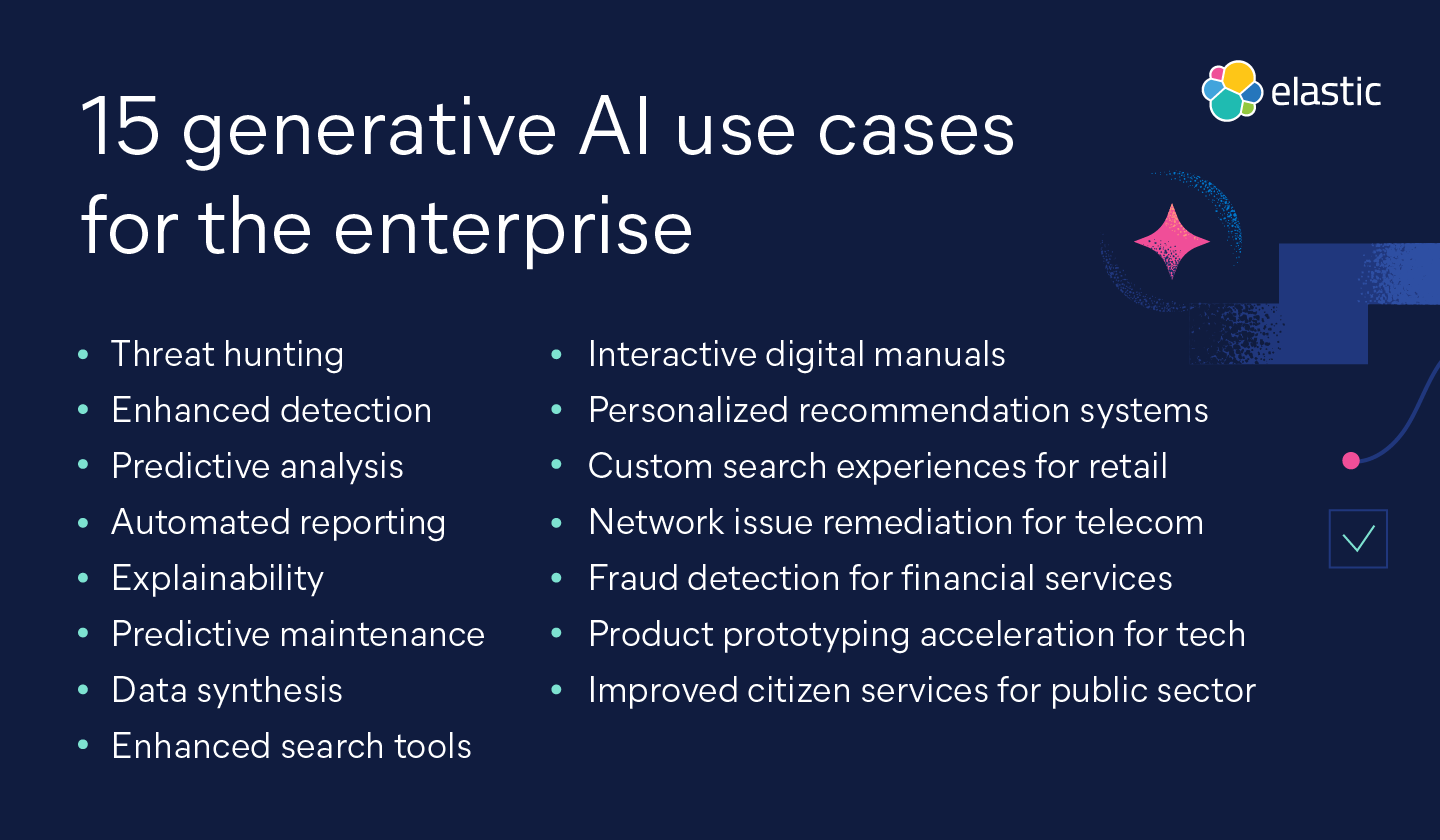15 generative AI use cases for the enterprise

There’s a lot of chatter about generative AI and what it can (and can’t) do. Generative AI, such as large language models (LLMs), creates original content by utilizing the patterns and structures it learned from extensive training data without storing the data itself. That includes creating things like text, software code, and art. While it can create content, it won’t be replacing humans any time soon.
Still, it is reshaping the landscape of industries worldwide from enhancing cybersecurity defenses to personalizing customer experiences. In fact, 99% of surveyed organizations say that generative AI has the potential to drive change in their organization.
Let's delve into ways generative AI unlocks new possibilities and transforms everyday business operations by assisting the humans who use it.

Generative AI bolsters cybersecurity defenses
Generative AI acts as a force multiplier for cybersecurity teams. It makes advanced security measures more accessible to junior analysts through intuitive natural language interfaces, allowing them to learn and apply complex security concepts without needing to be an expert in code or mathematics. And it helps senior analysts combat the ever-growing threat landscape that is being fueled by generative AI.
Here are some ways generative AI is transforming cybersecurity in threat detection, investigation, and response (TDIR):
Threat hunting: Say an analyst is trying to traverse through hundreds of alerts. What alerts are actual threats that need to be addressed? With generative AI, a security analyst can use the click of a button to triage hundreds of alerts down to a few attacks.
Enhanced detection: AI models enhance the detection of anomalous behaviors through pattern recognition, behavioral analysis, and more. Using natural language, an analyst can ask if there are unusual login attempts, irregular file access, or other indicators of malicious activity.
Predictive analysis: AI-driven systems can predict and identify potential vulnerabilities, suggesting proactive defenses before threats have a chance to make it through to your systems.
Automated reporting: In the event of a security incident, generative AI can automatically compile incident reports, including the nature of the incident, affected systems, potential impact, and recommended remediation steps. This empowers security analysts to take appropriate next steps.
Generative AI improves operational resilience
Generative AI can also enhance how businesses monitor and understand their operational data through AIOps — using AI to automate and streamline IT operations. Generative AI translates complex data sets into understandable insights through natural language, making it easier for non-experts and experts to make informed decisions, conduct root cause analysis, and limit downtime. Some key applications include:
- Explainability: For those needing domain-specific knowledge quickly, generative AI with retrieval augmented generation (RAG) capabilities can explain functions, logs, or traces in simple terms.

Predictive maintenance: In industries like automotive manufacturing, AI-driven predictive maintenance tools can help foresee and address system issues. Before a machine malfunctions, AI can predict and alert workers to address the problem before it affects the manufacturing process.
Data synthesis: Data indicating application issues can come from many sources. Site reliability engineers can use AI tools to help synthesize information from various sources into actionable reports, streamlining data and root cause analysis.
Get the steps to implement generative AI at your organization
Generative AI enhances customer experiences
Generative AI is revolutionizing customer experiences by personalizing interactions and simplifying customers' information discovery process. Here are some ways generative AI is impacting the user experience:
Enhanced search tools: AI search tools help users quickly find precise information, whether they are customers seeking product recommendations or service reps needing protocol guidelines to help a customer. When users can find what they’re looking for, satisfaction increases.
Interactive digital manuals: For industries like consumer products (say, a video doorbell), AI chatbots can provide real-time, interactive guidance on product features and troubleshooting. This can improve user satisfaction and reduce support calls.
Personalized recommendation systems: Generative AI can tailor product recommendations based on individual customer queries, enhancing personalization and satisfaction. In fact, 88% of online shoppers are more likely to continue shopping on a retailer website that offers a personalized experience, including 96%of Gen Zers and 97% of millennials.
Generative AI use cases in action
Organizations across industries are already benefiting from generative AI:
Retail: Customers can type a project they’re working on like “building a cat tree” into a home improvement site’s search bar and receive a complete list of necessary supplies — getting expert recommendations while streamlining their buying experience.
Telecom: Generative AI can proactively recommend and remediate network issues. Site reliability engineers can ask questions about network health and get answers in real time. This will reduce network downtime and emergency repair costs.
Financial services: Institutions can improve the accuracy and speed of fraud detection while reducing costs through task automation. By learning what behavior patterns to look out for, generative AI tools can help detect fraud while it’s happening in real time and suggest a next best action to the analyst to remediate.
Tech: Generative AI can accelerate product prototyping and design by augmenting the brainpower of humans to come up with more ideas, faster. This can help when creating new products, expanding services, and solving problems. Sales teams can use generative AI to create emails, summarize prospect interactions, and more. AI-assisted coding can help detect bugs in real time to lessen time to production.
Public sector: Generative AI can significantly accelerate mission outcomes, improve citizen services, and better connect government analysts and security professionals to the right data at the right time by securely connecting generative AI with agency data.
Learn how Cisco creates AI-powered search experiences with Elastic on Google Cloud
Generative AI is not about replacing human capabilities but enhancing and extending them. By improving processes across cybersecurity, observability, and customer experience, generative AI allows organizations in any industry to operate more efficiently, proactively, and responsively. As these technologies continue to evolve, the potential for transformative applications across industries seems boundless.
Make these use cases a reality. Get the steps to implement generative AI at your organization.
The release and timing of any features or functionality described in this post remain at Elastic's sole discretion. Any features or functionality not currently available may not be delivered on time or at all.
In this blog post, we may have used or referred to third party generative AI tools, which are owned and operated by their respective owners. Elastic does not have any control over the third party tools and we have no responsibility or liability for their content, operation or use, nor for any loss or damage that may arise from your use of such tools. Please exercise caution when using AI tools with personal, sensitive or confidential information. Any data you submit may be used for AI training or other purposes. There is no guarantee that information you provide will be kept secure or confidential. You should familiarize yourself with the privacy practices and terms of use of any generative AI tools prior to use.
Elastic, Elasticsearch, ESRE, Elasticsearch Relevance Engine and associated marks are trademarks, logos or registered trademarks of Elasticsearch N.V. in the United States and other countries. All other company and product names are trademarks, logos or registered trademarks of their respective owners.